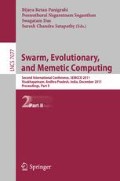Abstract
In this article, an evolutionary metaheuristic algorithm known as the Invasive Weed Optimization (IWO) is applied for automatically partitioning a dataset without any prior information about the number of naturally occurring groups in the data. The fitness function used in the genetic algorithm is a cluster validity index. Depending on the results of this index IWO returns the segmented dataset along with the appropriate number of divisions. The proficiency of this algorithm is compared to variable string length genetic algorithm with point symmetry based distance clustering(VGAPS-clustering), variable string length Genetic K-means algorithm(GCUK-clustering) and a weighted sum validity function based hybrid niching genetic algorithm(HNGA-clustering) and is denoted for the nine artificial datasets and four real life datasets.
Access this chapter
Tax calculation will be finalised at checkout
Purchases are for personal use only
Preview
Unable to display preview. Download preview PDF.
References
Bandyopadhyay, S., Saha, S.: A Point Symmetry Based Clustering Technique for Automatic Evaluation of Clusters. IEEE Transactions on Knowledge and Data Engineering 20(11) (November 2008)
Mehrabian, A.R., Lucas, C.: A Novel Optimization Algorithm Inspired from Weed Colonization. In: Ecological Informatics. Elsevier (2006)
Sepehri Rad, H., Lucas, C.: A Recommender System Based On Invasive Weed Optimization Algorithm. In: IEEE Congress on Evolutionary Computation, CEC 2007, pp. 4297–4304 (2007)
Bandyopadhyay, S., Maulik, U.: Genetic Clustering for Automatic Evolution of Clusters and Application to Image Classification. Pattern Recognition (2), 1197–1208 (2002)
D.N.A. Asuncion: UCI Machine Learning Repository (2007)
Holland, J.H.: Adaptation in Natural and Artificial System. The University of Michigan Press, AnnArbor (1975)
Sheng, W., Swift, S., Zhang, L., Liu, X.: A Weighted Sum Validity Function for Clustering with a Hybrid Niching Genetic Algorithm. IEEE Transactions on Systems, Man and Cybernetics – Part B: Cybernatics 35(6) (December 2005)
Ben-Hur, A., Guyon, I.: Detecting Stable Clusters Using Principal Component Analysis in Methods of Molecular Biology. Humana Press (2003)
Author information
Authors and Affiliations
Editor information
Editors and Affiliations
Rights and permissions
Copyright information
© 2011 Springer-Verlag Berlin Heidelberg
About this paper
Cite this paper
Chowdhury, A., Bose, S., Das, S. (2011). Automatic Clustering Based on Invasive Weed Optimization Algorithm. In: Panigrahi, B.K., Suganthan, P.N., Das, S., Satapathy, S.C. (eds) Swarm, Evolutionary, and Memetic Computing. SEMCCO 2011. Lecture Notes in Computer Science, vol 7077. Springer, Berlin, Heidelberg. https://doi.org/10.1007/978-3-642-27242-4_13
Download citation
DOI: https://doi.org/10.1007/978-3-642-27242-4_13
Publisher Name: Springer, Berlin, Heidelberg
Print ISBN: 978-3-642-27241-7
Online ISBN: 978-3-642-27242-4
eBook Packages: Computer ScienceComputer Science (R0)

